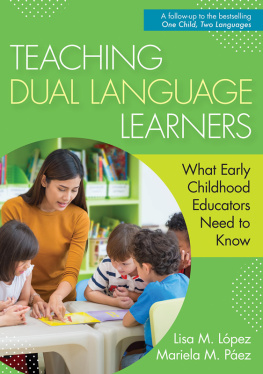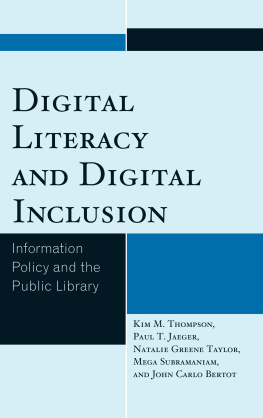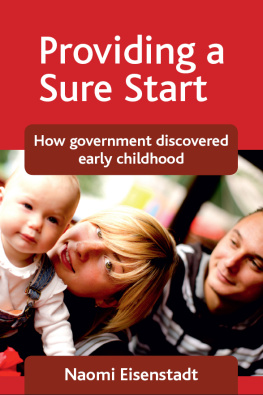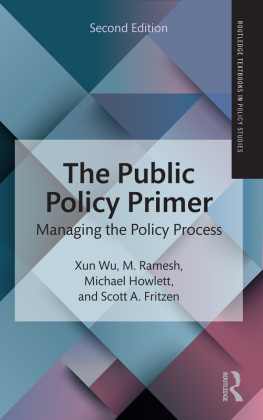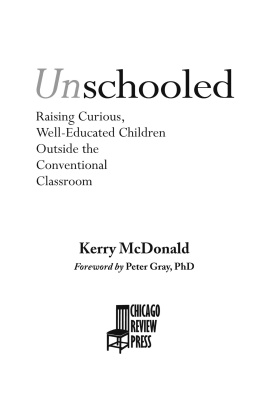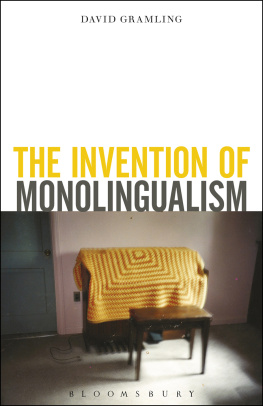
Published by Redleaf Press
10 Yorkton Court
St. Paul, MN 55117
www.redleafpress.org
2015 by Michael Gramling
All rights reserved. Unless otherwise noted on a specific page, no portion of this publication may be reproduced or transmitted in any form or by any means, electronic or mechanical, including photocopying, recording, or capturing on any information storage and retrieval system, without permission in writing from the publisher, except by a reviewer, who may quote brief passages in a critical article or review to be printed in a magazine or newspaper, or electronically transmitted on radio, television, or the Internet.
First edition 2015
Cover design by Jim Handrigan
Cover photograph by Ryan McVay/Photodisc/Thinkstock
Interior design by Dorie McClelland, Spring Book Design
Typeset in Adobe Minion Pro
Library of Congress Cataloging-in-Publication Data
Gramling, Michael.
The great disconnect in early childhood education : what we know vs. what we do / Michael Gramling.
pages cm
Includes bibliographical references and index.
ISBN 978-1-60554-400-7 (ebook)
1. Early childhood education--United States--History. 2. Early childhood education--Social aspects--United States. 3. Child care--United States--History. I. Title.
LB1139.25.G73 2015
372.21--dc23
2014041252
To my five children, Cotton, Willie, Lauren, Magnolia, and Amelia, who alternately validated and debunked every early childhood theory and every approach to parenting I had ever entertained, and who showed me that my best option was to strap myself in and enjoy the ride.
Contents
I was a stay-at-home dad in 1979 when I was hired as a classroom teacher at a local Head Start program, even though my only qualifications were that I liked kids and needed a job. Despite my lack of formal training, or perhaps because of it, I did a pretty good job and had a great time. My approach was simply to expose the children to as many different real-life experiences and real objects as I could muster. We planted things, built things, cooked things, climbed things, painted things, cleaned things, imagined things, and took care of living things, including each other. We played games and musical instruments, read a ton of books, and listened to all kinds of music, much of which I brought from home. We explored our neighborhood every day and our community whenever I could hijack a bus. Moreover, I engaged children throughout the day in authentic conversation. (That is to say, I talked to each child like a real person.) I created a climate in which all the children felt like the classroom belonged to them. They could change the schedule to accommodate a particular project, or rearrange the room to support an extended bout of imaginary play. No one was ever forced to participate. Children who preferred solitude could be by themselves.
I hasten to add that I was neither a maverick nor a rebel in my approach. My bosses were my enthusiastic supporters, and many of my colleagues took much the same approach. There was then as there is now an opposing camp who were aghast at what we did. Children needed structure, they said, and they needed to learn the fundamentals like letters, numbers, colors, and shapes. Most of all, they needed to learn how to conform to the demands of institutional life. The kind of open-ended operation I was running might be fun, but it did children a disservice and would not prepare them for success in school.
We had no way of proving in my early years of teaching whether what we were doing for children was best or even right. I could not say with any certainty if the children in my classrooms went on to perform any better in school or, as adults, if they were better able to compete in the global economy. But since then, our approach has been vindicated by a great deal of research. What is most fundamental during early childhood, we have learned, is not the alphabetit is healthy brain development. The brain goes through an intense period of activity that will never be repeated in later years, and the extent and effectiveness of that activity is to a large degree a product of the experiences and conversations to which the child is exposed during the early years. So certain is our profession of this phenomena that programs are springing up all over the country that encourage parents, particularly low-income parents, to talk to their children much more and to give them a variety of experiences to talk aboutwhich makes it all the more puzzling that in modern early childhood classrooms, children are barely spoken to at all.
For the past two decades I have spent most of my time visiting early childhood programs all over the United States, observing classrooms and listening to the concerns of teachers, managers, directors, and principals. I have become intimately familiar with early childhood education as it is actually practiced in the United States, and I have grown increasingly discouraged. What I initially understood to mean that the opposing camp had a lot of followers in the wider world has given way to the stunning realization that the opposing camp has completely won the day. Despite the accumulated knowledge of the past three decades, under the misguided banner of school readiness and accountability, the preschool experience has been reduced to tedious rote learning and strict conformity to routines. It is not that the practices we once held dear have vanished completelythey have become instead the almost exclusive purview of the well-to-do. Judging from the ever-widening achievement gap between rich and poor, it seems to be working quite well for them.
I have therefore devoted a great deal of my time and energy persuading one teacher, one program at a time to give children what they know is bestand there lies the problem. Im not telling them anything they dont already know. They know child development. Theyve studied brain research. But they feeland rightly socompletely constrained by public policy that demands that children be taught in a heavily scripted, incremental manner that flies in the face of everything they know is true.
So I decided to write this book. It is addressed to policy makers who perhaps are not aware of the everyday consequences to children and teachers of learning standards and accountability. It is addressed to teachers, school districts, and Head Start programs who have it within their power to provide the critical experiences and rich discourse children need in spite of the demands of the bureaucracies that look over their shoulders. It is written to parents who are considering enrolling their children in pre-K, Head Start, or child care so that they can make informed decisions about how their children will spend their time during their most formative years.
Childhood only happens once. It is our responsibility to make sure we make the most of it.
I want to thank some of the many folks who shared in the development of this book, beginning with my friend and colleague Luis Hernandez, whose generous spirit has provided me with any number of opportunities to say what was on my mind, including the time, shortly after the publication of his own coauthored book Learning from the Bumps in the Road, that Luis made the offhand remark that Redleaf Press might be interested in my stuff. I had a twenty-page article that I had peddled unsuccessfully to various periodicals (who publishes twenty-page articles, anyway?), and I had given up on it, but Luiss comment struck me as a good omen.
I sent the article to Redleaf as an attachment in an e-mail with the subject line My good friend Luis Hernandez and was delighted when I heard back almost immediately from Kyra Ostendorf and David Heath, who had taken the time to read an unsolicited article. As it turns out, they dont publish twenty-page articles either, but they encouraged me to turn it into a book, and they have continued to support me throughout the process.
Next page

